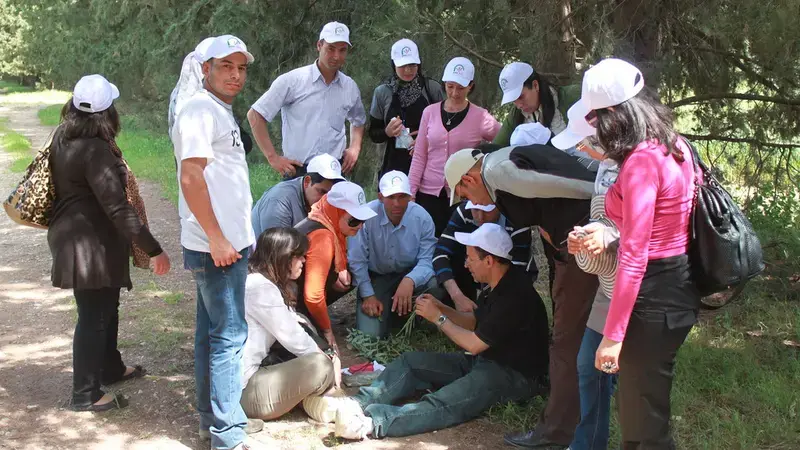Strengthening the capacity of early career researchers

Capacity strengthening is core to ICARDA’s mission: it delivers quality research and development impact and ensures that agricultural investments are sustainable over the long-term. Targeting young scientists is especially important as investments now could deliver impacts for decades to come – ensuring that countries and institutions have the right combination of skills and knowledge to meet future challenges.
A crop science capacity strengthening partnership with Morocco’s Institut National de la Recherche Agronomique (INRA) is providing supervision and research and training opportunities for MSc and PhD researchers. Part of ICARDA’s Morocco platform, the partnership targets the intensification and diversification of rainfed cereal-based production systems, and reflects the needs and priorities of small holder farmers. Given that many of the best qualified dryland agricultural researchers are now nearing retirement it is also extremely timely.
A two-way relationship
The relationship between students and institutions is two-way: while students benefit from the support of ICARDA, INRA and other partner organizations, these institutions in turn benefit from the knowledge and expertise of students who contribute new ideas and perspectives to on-going research efforts. Early-career researchers are selected on a competitive basis and nominated by their institutions.
“ICARDA recognizes that investing in young early-career researchers now can help prepare countries for future challenges related to agricultural production and food and nutritional security,” says Ahmed Amri, Head of ICARDA’s Genetic Resources Section and the Center’s representative in Morocco. “Equally, we also benefit from the involvement of the students themselves who are highly capable and may look at challenges in a different way.”
In addition to the quality of the students’ research, the initiative also considers its relevance and consistency with the priorities of ICARDA, its partners, and national governments. For Moroccan students, for instance, this could mean consistency with the country’s Green Morocco Plan, an ambitious national initiative designed to strengthen the sustainability and competitiveness of the country’s critically-important agricultural sector.
An integrated ‘systems’ approach
Research themes include the evaluation of genetic resources and their use in breeding and pre-breeding; the use of genotyping and precision phenotyping to efficiently select elite germplasm; and assessments of the quality and nutritional attributes of cereals and legumes. To achieve an integrated approach, the initiative supplements these core themes with additional subjects, including proven disease and pest management techniques, stress physiology, assessments of biodiversity and the uses of native pollinators, and improved cropping systems such as water use efficiency.
Since its inception five years ago, ICARDA’s Morocco platform has emerged as major training hub. The platform hosts a gene bank, first-rate laboratory facilities, and a research station where strategic crop germplasm are developed for resistance or tolerance to a range of stresses. Two symposia have also provided participants with a platform to present their research – an opportunity to fine-tune presentation skills and gain invaluable feedback from experienced researchers.
There are currently 87 graduate students and interns working under the supervision of ICARDA scientists or benefiting from in-depth and focused training opportunities. While the majority are from Morocco, around 10 percent are from neighboring countries or further afield.
Professional development
Early career researchers include Meryem Zaim, a Moroccan PhD student, who studied the genetics of yield stability in durum wheat – testing a global panel of 370 elite lines, accessions and landraces in 15 different environments. The results helped identify the genes that control stability, which can assist in the development of stable durum wheat cultivars. ICARDA provided the facilities and expertise to support Meryem’s research and its contributions to more stable durum wheat yields, higher incomes for farmers, and climate change adaptation.
Another participating researcher is Nour Abed, from Algeria’s National Institute of Agronomic Research, who worked alongside ICARDA scientists to select strains of rhizobia-nodulating food legumes, evaluating their potential to enhance the biological fertilization of degraded soils and reduce fallow. The experience, she suggested, exposed her to diverse perspectives: “ICARDA not only enabled me to carry out my research, but also broadened my scientific knowledge and interests – because I worked alongside specialists from different disciplines and different parts of the world.”
This experience has not only provided an opportunity to grow professionally, but also strengthened commitments to agricultural research and exploring the innovations that help resource-poor farmers adapt to climate change and other challenges. The aim now is to build on this initial success and develop a capacity strengthening hub targeting even higher numbers of early career researchers who can then go on to apply the knowledge and insights they have gained, and help strengthen the resilience of farmers and their production systems.
